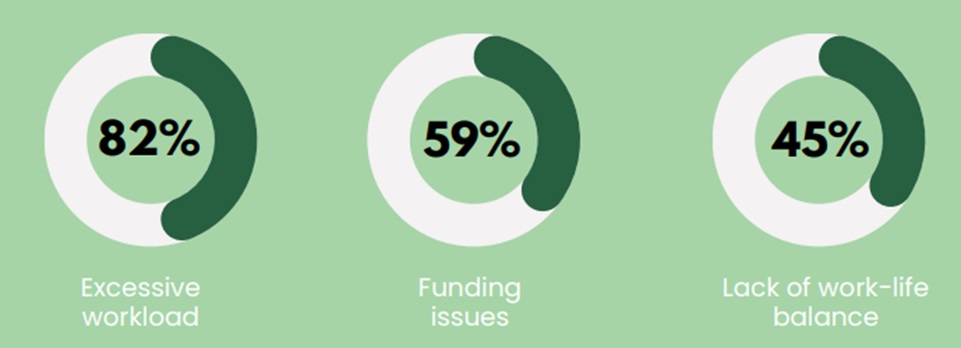Published
By CPC Helpdesk
In line with a continued dedication to the education sector, Staff Absence Protection & Reimbursement framework supplier Education Mutual are proud to unveil the release of their annual School Business Leader Wellbeing Index - and we have given them the platform to inform you about it.
School Business Leaders (SBLs) are the unsung heroes who keep things running smoothly in our schools. They're not just managing day-to-day tasks; they're also driving the success and growth of the educational institutions they work in. Our latest research, the second edition of this annual project, digs deeper into their mental health and wellbeing, giving us direct insights from those incredible individuals.
We use the term “SBL” to cover all the different roles involved in keeping the school running smoothly. Whether you’re a school business leader, a HR professional or part of the administration team, your contributions, are crucial in keeping state-funded primary, secondary and special schools in England and Wales, providing the best possible service.
What did we discover?
Our research indicates that 88% of schools currently provide mental health and well-being services for their staff members, a slight decrease from the 94% reported in 2023. While the quantity of services offered remains steady, there is a noticeable decline in the uptake of services across all support categories, most notably with the decrease in staff engagement with well-being sessions, falling from 8% in 2023 to 4% in 2024.

Workload remains the number one challenge impacting on SBL’s mental health, with a significant rise from 48% in 2023. The sheer range of tasks involved in running the day-to-day operations make the role massively demanding, causing feelings of stress, frustration and a sense of isolation, as their job extends into non-working hours, affecting their personal and social life.
We have identified that frequent interruptions and requests from staff members considerably added to workload and meant SBLs were drawn away from their work when staff could have, in some cases, completed the task themselves. One SBL told us: “There’s always the view that ‘SBL will sort it, SBL can do that.’ I have pointed out that what they don’t realise is that every single member of staff says that.”
The significant rise in SBLs feeling that a heavy work burden was negatively impacting their mental health has had a real knock-on effect. We found that leaders were anxious about their impending workload and were often awake at night worrying about work concerns. In more serious cases, some SBLs didn’t want to go to work, while some were seriously considering remaining in the industry at all.
Funding issues has also seen a sharp increase on last year, becoming the second most pressing challenge SBL’s face. Our research shows that SBL’s were feeling demoralised by the negative impacts of funding challenges to staff, particularly when having to communicate cuts to working hours or where there has been reduction to provision for pupils. One SBL tells us: “It’s very stressful. You can’t pay people if you have no funding. It’s a question of balancing things, like giving a child a laptop or paying the cleaners. Sometimes it’s demoralising”.
What can I do?
As you play a crucial role in the school’s functioning and success, we would recommend sharing this report with your headteacher. Take note of the relevant findings from the report to start making the necessary changes within your school to help prioritise mental health and well-being.
The full 2024 report can be found at https://www.educationmutual.co.uk/school-business-leader-wellbeing-index-2024/
Our recommendations for SBLs
Can you approach a colleague or senior leader within your school or academy trust to informally share ideas or opinions with?
They may not be SBLs, but they understand the school’s culture and challenges. It might help combat any isolation in your role.
Can you join local or national groups and support networks of SBLs, where experiences can be shared, and issues discussed?
Perhaps your Local Authority or MAT chain runs one? If they do not exist, maybe you can start one? Even a WhatsApp group of a few local SBLs could be an incredibly helpful resource.
Think about your own mental and physical health and the ways in which this could be improved
It is all too easy to forget about your own needs when in a busy role helping others – it must be an equal priority.
Our recommendations for senior leaders
Use this report to start a conversation with your SBLs
Do our findings chime with their experience? How can they best be supported?
Improve awareness of the SBL role to staff working at all levels.
This will lead to better understanding and appreciation of what the role involves.
Consider how you can offer all staff access to wellbeing services.
This could be services such as helplines, counselling or training in cases where this is restricted to certain job roles.
Encourage external networking with others in similar roles
Signpost to relevant sources of support and additional resources, in order to combat the isolation felt by many SBLs.
Reassure all staff that wellbeing services are confidential
They are safe to use and there shouldn't be any fear of potential consequences.
Take the time to look at your staff absence protection and make sure you and your staff members are receiving the best possible service.
Education Mutual is committed to the sector, offering face-to-face counselling, live webinars throughout the year, a 24/7 GP line and much more.
Related News
Data Centre Equipment & Infrastructure framework arrives
Expanding CPC's selection of ICT & Telecoms purchasing agreements, NEUPC's Data Centre Equipment & Infrastructure framework is ready to utilise.
Read moreCPC awarded UK’s Best Workplaces™ recognition!
CPC has officially been named one of the UK’s Best Workplaces™ 2024 by Great Place To Work®, the global authority on workplace culture.
Read moreInvitation to Tender for Security Services framework
The Invitation to Tender (ITT) for our new Security Staffing and Associated framework has been published on MultiQuote (project ref CA13538).
Read more